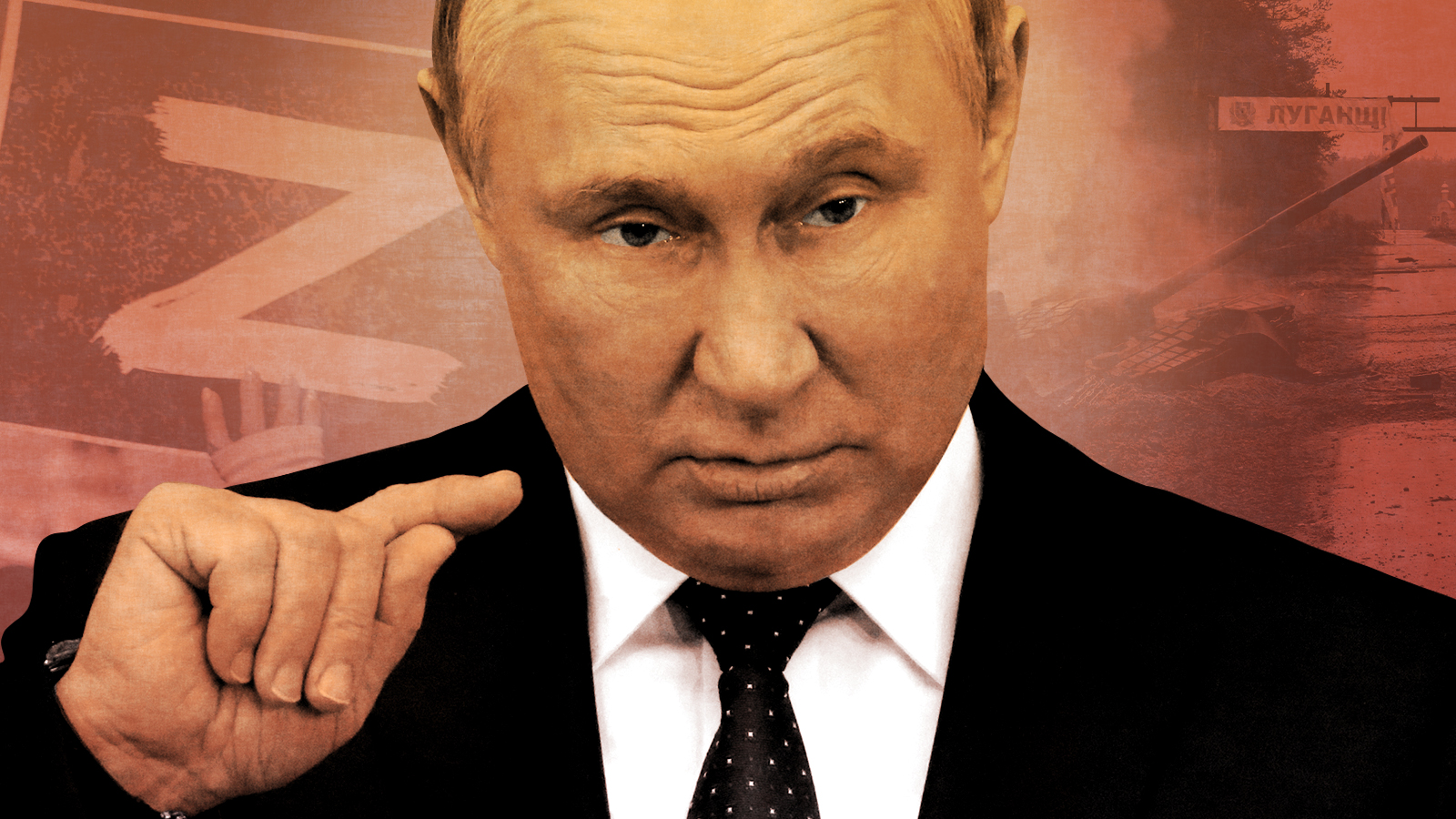Winning on the battlefield won't bolster Russia strength
The invasion of Ukraine has revealed Moscow's true weakness


A free daily email with the biggest news stories of the day – and the best features from TheWeek.com
You are now subscribed
Your newsletter sign-up was successful
After a faltering, downright humiliating, military defeat in Ukraine's north, categorized by burned-out tanks and stalled armored convoys, the Russian army is now executing what it describes as the "second phase" of its war in Ukraine. The objective: to extend its control over the entire Donbas region and perhaps turn Ukraine into a land-locked country without access to the Black Sea.
The United States has rushed billions of dollars in military equipment to help Kyiv stem the Russian advance. Defense Secretary Lloyd Austin said Washington wants to see Russia "weakened" so it can't invade a neighboring power ever again. But whether Russia wins or loses in the Donbas, it will emerge from the war in a weaker geopolitical position than when it came in.
Economically, the sanctions and import restrictions imposed by the U.S., European Union, and Japan have had a devastating effect on a largely anemic Russian economy. More than 700 international companies have either pared down their activities in Russia or left the market entirely. Half of Moscow's $630 billion in foreign reserves, which were once seen by the Kremlin as an insurance policy in the event of a severe domestic or international event, is inaccessible due to U.S. and European blocking measures.
The Week
Escape your echo chamber. Get the facts behind the news, plus analysis from multiple perspectives.

Sign up for The Week's Free Newsletters
From our morning news briefing to a weekly Good News Newsletter, get the best of The Week delivered directly to your inbox.
From our morning news briefing to a weekly Good News Newsletter, get the best of The Week delivered directly to your inbox.
As of this month, Russia can no longer use reserves held in U.S. banks to pay down debt, forcing Putin to spend more of his accessible Russia's rainy day fund toward staving off default. In total, the World Bank projects Russia's economy to contract by more than 11 percent this year (some estimates are higher), which would be the worst decline in nearly 30 years.
Putin's war of choice in Ukraine has shocked Europe out of its comfort zone. European countries that hadn't taken their defense obligations seriously, including Germany, Italy and Spain, are now on the way toward implementing rearmament plans or adding more money to their defense budgets. If Putin thought invading Ukraine would generate a reassessment within NATO on the wisdom of forward deployments along the alliance's eastern front, then he made a major miscalculation; there are now more, not fewer, NATO troops stationed in the Baltics, and NATO policymakers are examining whether permanent deployments in the area are appropriate.
Sweden and Finland, which have historically taken pride in their neutrality, are likely to submit applications for NATO membership (whether either country actually needs NATO protection given their formidable military capability is another matter). French President Emmanuel Macron, who has tried to build a bridge between Europe and the Kremlin, has essentially soured on the effort — leaving Russia largely isolated in Europe, save for Hungary's Viktor Orban. Even Italy's populist political parties no longer believe a rapprochement with Moscow is possible or politically expedient.
Europe is asserting itself in other ways as well. If the Continent was highly dependent on Russian energy sources before the war (the EU imported 40 percent of its gas and 27 percent of its oil from Russia in 2021), it's now making a concerted push to eliminate that dependency. While Germany remains opposed to an immediate cut-off of Russian oil and gas in order to protect German industry from the negative economic impact, weaning itself off Russian energy sources is now official government policy in Berlin. German Foreign Minister Annalena Baerbock stated Berlin will end imports of Russian oil by the end of the year. Italy, meanwhile, is hard at work diversifying its suppliers, signing a new energy deal with Algeria this month.
A free daily email with the biggest news stories of the day – and the best features from TheWeek.com
Russia, of course, will be able to compensate for these losses by selling more of its oil and gas to Asian powerhouses like China and India. But the Russian government may find it difficult to do so without offering deep discounts.
Putin's gamble in Ukraine has therefore altered the geopolitical landscape for Russia in a way the strongman never intended. A "special military operation" Putin believed would be relatively low cost has instead transformed into a strategic morass, with thousands of Russian troops dead, thousands more wounded, and an economy bleeding talent as high-skilled Russian workers flee for greener pastures.
Beijing may support Russia for the time being, but Chinese policymakers have their own interests at heart. They are concerned about the strategic and economic consequences resulting from Russia's Ukraine policy. If Putin hopes his friend, Xi Jinping, will bail him out in perpetuity, he is at risk of making yet another big mistake.
Daniel R. DePetris is a fellow at Defense Priorities and a foreign affairs columnist for Newsweek.
-
 Why is the Trump administration talking about ‘Western civilization’?
Why is the Trump administration talking about ‘Western civilization’?Talking Points Rubio says Europe, US bonded by religion and ancestry
-
 Quentin Deranque: a student’s death energizes the French far right
Quentin Deranque: a student’s death energizes the French far rightIN THE SPOTLIGHT Reactions to the violent killing of an ultraconservative activist offer a glimpse at the culture wars roiling France ahead of next year’s elections
-
 Secured vs. unsecured loans: how do they differ and which is better?
Secured vs. unsecured loans: how do they differ and which is better?the explainer They are distinguished by the level of risk and the inclusion of collateral
-
 Putin’s shadow war
Putin’s shadow warFeature The Kremlin is waging a campaign of sabotage and subversion against Ukraine’s allies in the West
-
 Epstein files topple law CEO, roil UK government
Epstein files topple law CEO, roil UK governmentSpeed Read Peter Mandelson, Britain’s former ambassador to the US, is caught up in the scandal
-
 Iran and US prepare to meet after skirmishes
Iran and US prepare to meet after skirmishesSpeed Read The incident comes amid heightened tensions in the Middle East
-
 Israel retrieves final hostage’s body from Gaza
Israel retrieves final hostage’s body from GazaSpeed Read The 24-year-old police officer was killed during the initial Hamas attack
-
 China’s Xi targets top general in growing purge
China’s Xi targets top general in growing purgeSpeed Read Zhang Youxia is being investigated over ‘grave violations’ of the law
-
 Ukraine, US and Russia: do rare trilateral talks mean peace is possible?
Ukraine, US and Russia: do rare trilateral talks mean peace is possible?Rush to meet signals potential agreement but scepticism of Russian motives remain
-
 Panama and Canada are negotiating over a crucial copper mine
Panama and Canada are negotiating over a crucial copper mineIn the Spotlight Panama is set to make a final decision on the mine this summer
-
 The rise of the spymaster: a ‘tectonic shift’ in Ukraine’s politics
The rise of the spymaster: a ‘tectonic shift’ in Ukraine’s politicsIn the Spotlight President Zelenskyy’s new chief of staff, former head of military intelligence Kyrylo Budanov, is widely viewed as a potential successor
